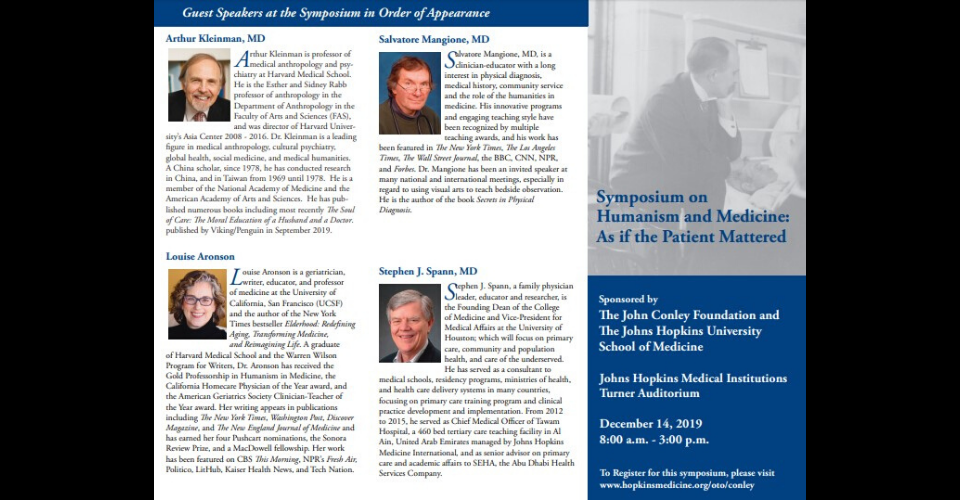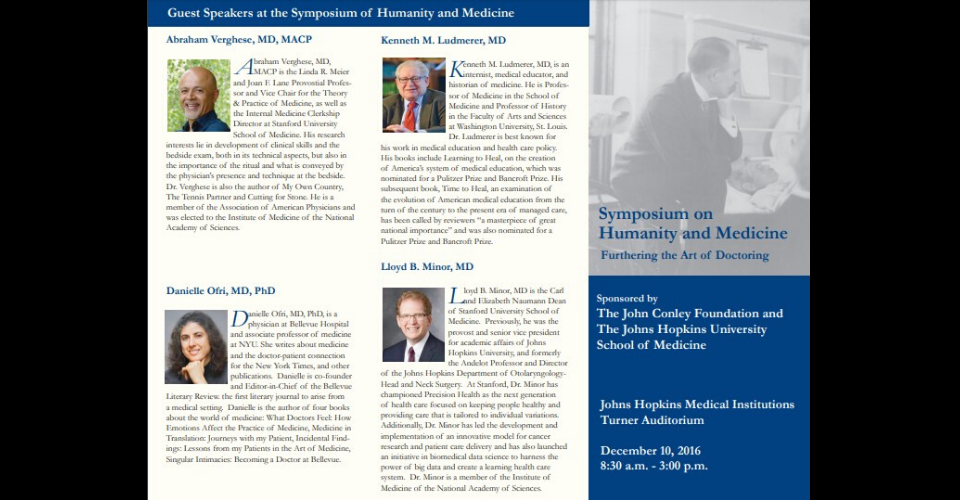-
David Eisele, M.D.

- Andelot Professor of Laryngology and Otology
- Director of the Department of Otolaryngology-Head and Neck Surgery
- Professor of Otolaryngology - Head and Neck Surgery
- Professor of Anesthesiology and Critical Care Medicine
- Professor of Oncology
-
Alexander Hillel, M.D.

- Professor of Otolaryngology - Head and Neck Surgery
- Professor of Anesthesiology and Critical Care Medicine
Professionalism Committee
Code of Conduct
The Department of Otolaryngology-Head and Neck Surgery has developed a code of conduct to promote a positive work environment and enable the best patient care.
Behaviors that create a civil work environment and enable us to fulfill our missions of excellence in patient care, education, and research.
-
- Be respectful, civil and cooperative with colleagues and co-workers
- Recognize that every member of the team makes important contributions
- Ensure that all team members understand overall team goals and their roles
- Ensure safe and thorough transfer of patient care to covering faculty
- Practice peer and patient confidentiality
- Avoid favoritism and side-stepping of rules
- Arrive on time
- Follow dress code
-
- Practice frequent, respectful and clear communication
- Recognize importance of language, non-verbal behavior, gestures and attitudes in communicating respect for dignity of others
- Refrain from use of abusive language, threats of violence, retribution, or intimidation
- Refrain from gossip or derogatory discourse
- Refrain from making inappropriate remarks about quality of care in public — address colleagues directly in private setting or in privileged and confidential conferences
- Provide prompt, direct constructive feedback in objective terms in a private setting when concerns or disagreements arise
- Take any concern (real, perceived, big, or small) seriously and try to understand and resolve — ask for help from Department Leadership if the concern is beyond your ability or scope of authority
-
- Acknowledge patients and family with eye contact
- Introduce yourself (name and role) to patient and/or family member(s)
- Explain to patients and family the plan of care and next steps
- Support your colleagues/team in front of patients and family
-
- Treat learners with dignity and respect.
- Behaviors that are considered Learner Mistreatment will not be tolerated. These behaviors include:
- Public embarrassment or humiliation
- Name calling
- Threaten with or engage in physical harm
- Require learners to perform personal services
- Subject learners to unwanted sexual advances, or ask learners to exchange sexual favors for grades or other rewards
- Subject learners to sexist or to racially or ethnically offensive remarks/names, or to offensive remarks/names related to sexual orientation
- Give learners lower evaluations or grades solely because of gender, or because of race or ethnicity, or because of sexual orientation rather than performance
- Deny learners opportunities for training or rewards based on gender, based on race or ethnicity, or based on sexual orientation
- Subject learners to negative or offensive behavior(s) based on your personal beliefs or personal characteristics other than your gender, race/ethnicity, or sexual orientation
Activities
- Faculty Reflection Rounds
- Resident Reflection Rounds
- Book Club
- Undaunted Courage, Steven Ambrose
- A Crack in Creation, Jennifer Doudna
- The Diversity Bonus, Scott Page
- Being Mortal, Atul Gawande
- Cutting for Stone, Abraham Verghese
- The Boys in the Boat, Daniel James Brown
- Factors Related to Burnout in Otolaryngology - Head and Neck Surgery (PDF)
- Duane Sewell Memorial Leadership
- 2016: “The Hippocratic Oath: Is It Still Relevant?” (PDF)
- 2014: “First Do No Harm” (PDF)
- 2012: "Beyond Mandates" (PDF)
- Other Institutional Efforts
- Joy at Johns Hopkins Medicine
- IEEE conference 2019 Education Conference and Celebration- "Respect, Teamwork and Civility: Embracing Our Educational Mission."
Symposium on Humanism and Medicine
Professionalism Committee Members:
Civility Policy for Faculty
-
- Every employee of our Department has the right to work in an environment where they are treated with dignity and respect.
- Incivility in the Department has costs financially and in terms of patient safety.
- Creating a civil environment in the workplace is the right thing to do.
-
- All faculty are expected to follow the Department’s Code of Conduct (Appendix 1). Faculty will be expected to sign the Code of Conduct annually to indicate that they understand and will follow the Code of Conduct.
- Behaviors that are considered unacceptable in the Department of Otolaryngology include:
- Aggressive/abusive language towards other employees (including ridiculing others, using expletives)
- Publicly berating employees
- Addressing employees in a bad mood or fit of rage
- Addressing employees in a way that is non-collaborative, non-constructive, unhelpful. Consider the impact of one’s communication on the recipient.
- Making derogatory remarks about another employee based on their race, ethnicity, national origin, gender, religion, etc.
- Physical violence or sexual misconduct
- These behaviors can occur in person, or via electronic communication (email, text, etc)
- The Department will maintain a confidential system to report these behaviors. All reports will be reviewed and adjudicated by the Department Director or a Designee.
- Faculty who engage in uncivil behavior will be subject to disciplinary action. The actions will escalate if the behaviors continue. These actions may include:
- 360° evaluation
- Communication/civility training
- Coaching
- Review of faculty member’s email communications with support staff/trainees over a period of time
- Removal from leadership responsibilities
- Institutional measures outlined in gold book (including reduction in base salary, reduction in incentive pay, termination)



